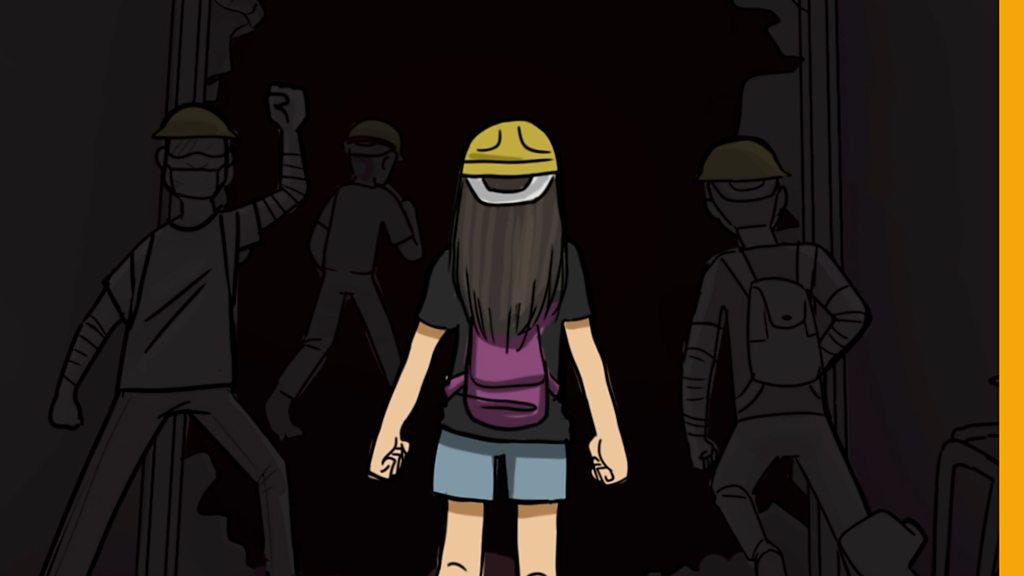Hong Kong: China bans Cathay Pacific staff seen to support protests
- Published
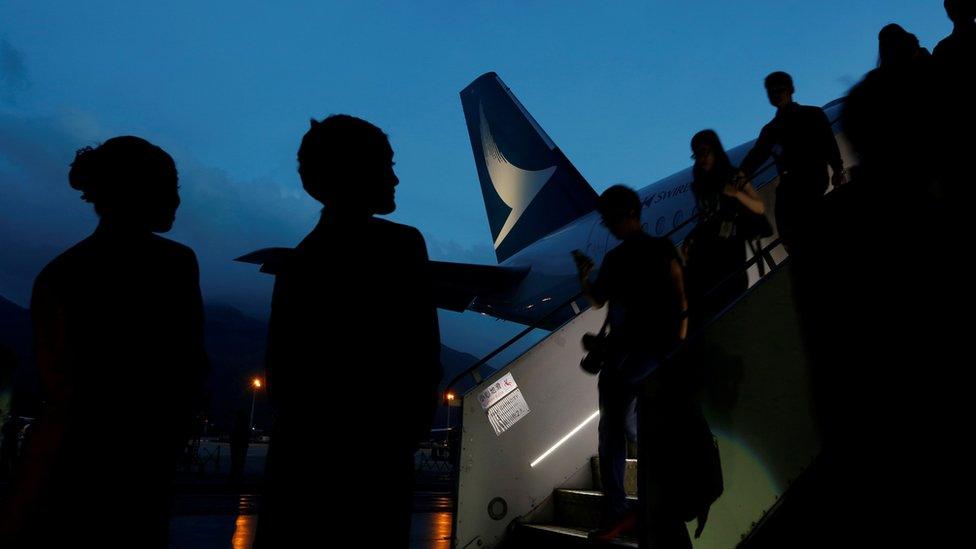
The Cathay chairman said he "wouldn't dream" of telling his staff what to think
China's aviation regulator has ordered the Hong Kong-based airline Cathay Pacific to suspend any staff who support pro-democracy protests in the territory.
Beijing's demand coincided with a peaceful rally at Hong Kong's airport, where thousands occupied a terminal.
Cathay also faced pressure online after China's state-run press fuelled a #BoycottCathayPacific hashtag, which trended on Chinese social media.
Hong Kong has seen weeks of protests over China's control of the territory.
The protests began about nine weeks ago over a proposed extradition bill between Hong Kong and mainland China and evolved into demands for greater freedoms.
Hong Kong is part of China but its citizens have more autonomy than those on the mainland. It has a free press and judicial independence under the so-called "one country, two systems" approach - freedoms activists fear are being increasingly eroded.
China fuels boycott campaigns
Earlier this week China warned the pro-democracy protesters in Hong Kong not to "underestimate the firm resolve of the central government".
This week China appeared to turn its attention to companies it sees as connected to the protests. Cathay was targeted after one of its pilots was arrested among protesters, and the airline's flight attendants union signed a joint statement with other aviation industry employees backing the protesters.
"The four sins of Cathay Pacific Airlines," read a headline in Chinese state newspaper the People's Daily, which detailed actions by the carrier it said were supportive of the pro-democracy movement.
Why did protesters take to the streets in Hong Kong?
Cathay chairman John Slosar defended his staff. "We employ 27,000 staff in Hong Kong doing all sorts of different jobs... we certainly wouldn't dream of telling them what they have to think about something," he said.
A Taiwanese bubble tea franchise - Yifang - and a popular Japanese sports drink were also targeted by boycott campaigns. One of Yifang's branches in Hong Kong had reportedly hung a sign cheering on the protesters. The branch was later vandalised, Taiwanese broadcaster TVBS reported.
Japanese sports drink Pocari Sweat pulled advertising from Hong Kong television station TVB, which protesters accuse of pro-Beijing coverage.
Under pressure of a boycott, the firm's mainland China office issued a statement saying it operated separately from the Hong Kong division and upheld China's "one country, two systems" rule.
What happened at the airport?
The boycotts came as protesters gathered at Hong Kong airport for three days of peaceful demonstrations.
Activists waved banners written in different languages denouncing Carrie Lam, Hong Kong's chief executive, and the police, and handed out leaflets with artwork explaining the recent protests.
Allow X content?
This article contains content provided by X. We ask for your permission before anything is loaded, as they may be using cookies and other technologies. You may want to read X’s cookie policy, external and privacy policy, external before accepting. To view this content choose ‘accept and continue’.

Authorities are so far tolerating the rally, which have not overly disrupted passengers. There are as yet no police at the scene.
"It will be a peaceful protest as long as the police do not show up," one demonstrator told Reuters news agency.
Fake boarding passes saying "HK to freedom" appeared on social media, external to promote the rally. Hong Kong's Airport Authority said it would "operate normally", external despite the planned demonstrations.
A protest at the airport on 26 July with thousands of Hong Kongers - including flight staff - took place without violence.
How have authorities reacted?
Ms Lam met business leaders on Friday to discuss the economic impact of the protests. "We've experienced Sars and financial crises," she told reporters after the meeting, referring to the respiratory disease epidemic in 2003. "This time is more serious."
Property developers in the territory had earlier warned that demonstrations were damaging Hong Kong's economy.
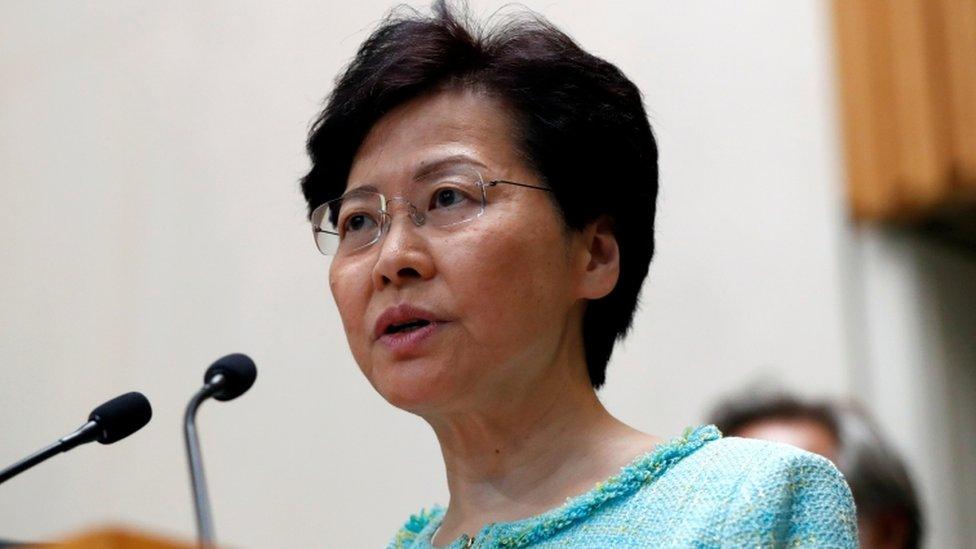
Ms Lam spoke to reporters after a meeting with business leaders
Ms Lam also announced the government would reconvene a week earlier than planned from recess on 13 August. But she refused to offer concessions to protesters, accusing a "small minority of people" of wanting to destroy the economy and of having "no stake in the society which so many people have helped to build".
"If you are unsatisfied with the Hong Kong government that does not mean you should condone the violence. We hope to do our work better," she said.
Earlier on Friday, authorities confirmed that former deputy police commissioner Alan Lau has been brought out of retirement to help handle protests in the territory. The commander previously oversaw Hong Kong's pro-democracy rallies in 2014.
Beijing has issued increasingly stern warnings about the continuing demonstrations, and the military recently released a video showing them conducting anti-riot drills.
The US on Friday called China a "thuggish regime" after a Chinese state newspaper published the name and photo of a US diplomat talking to Hong Kong activists.
China dismissed the remark as "gangster logic". The Chinese have repeatedly accused the US of interfering in the situation in Hong Kong.
- Published6 August 2019
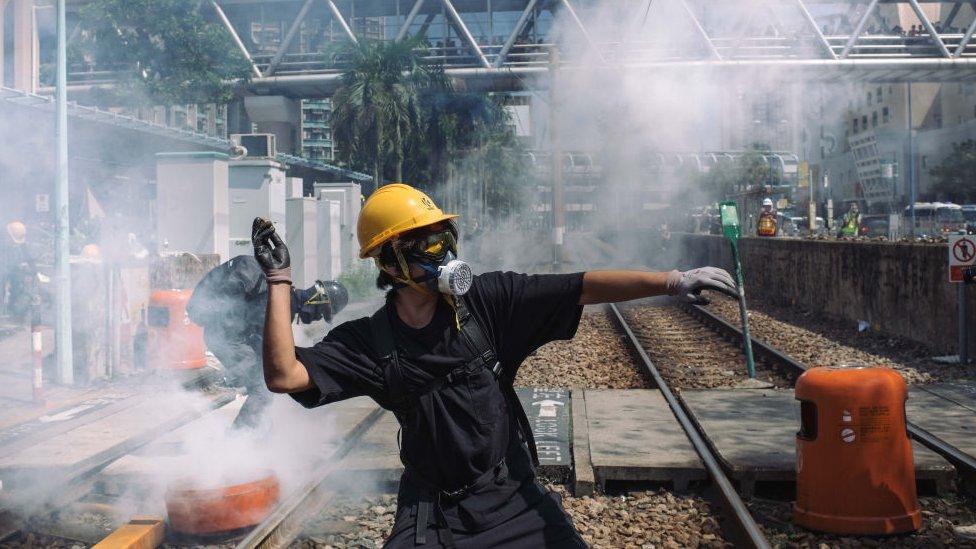
- Published5 August 2019
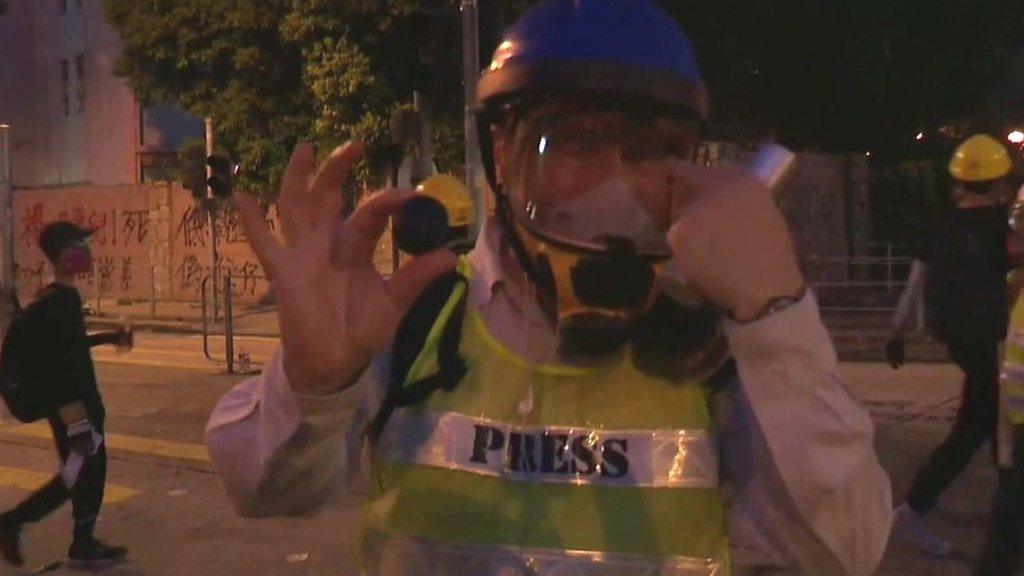
- Published1 August 2019
